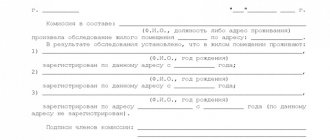Last modified: January 2021
Citizens registered on a permanent basis in housing from the municipal fund have the right to apply to the administration with a request for privatization. This right is granted once, giving the opportunity to transfer the property to personal disposal without any payment. However, the re-registration procedure is purely voluntary. If desired, you can formalize a refusal of privatization, while retaining the right of lifelong residence in the former territory.
What does refusal mean?
According to the privatization legislation, housing is transferred into ownership from the state or municipal fund with the general consent of all registered citizens. If any of the residents does not want to accept part of the property, the law does not oblige them to do so, but they will have to formalize a refusal in favor of the remaining residents.
Unlike the refusal of heirs, when a person irrevocably loses the right to take a piece of real estate into personal ownership, a privatization refusal does not mean that a person completely loses the right to privatize municipal property. In addition, if privatization is refused, the right of use is retained, and the citizen has the right to use the occupied living space indefinitely.
Indefinite use of residential premises means the ability to use any part of the apartment, including living rooms and common areas. The only limitation is the inability to dispose of part of the real estate, sell it, donate it, exchange it, or register it as collateral.
The refusal to privatize is formalized in writing at a notary's office with mandatory certification that the decision is voluntary. This requirement is mandatory to avoid possible problems with property claims in the courts.
For whose benefit can this be done?
As mentioned above, one of the most common reasons for refusing to obtain ownership of privatized housing is the transfer of one’s share to another person. However, you should be aware that those not participating in the procedure for transferring housing into private ownership can renounce their share only in favor of those persons who also have the right to privatize a specific apartment. As a rule, these are family members living in the same municipal housing.
In addition, you cannot write a refusal in favor of a specific person. In any case, the released share will be proportionally redistributed among all participants in the transaction.
When required
There are many reasons for registering a refusal to privatize:
- Removing obstacles to privatization measures for other residents while maintaining the right to take advantage of privatization later. If you refuse now, it will be impossible to challenge your own decision later.
- Reluctance to pay real estate taxes after taking over the property.
- The intention is to obtain council housing with a larger area, in a better area and amenities. Such situations include refusal to live in a dilapidated, dilapidated house, hostel, communal apartment, or closed community. In the future, upon receiving a better apartment, the citizen will be able to exercise his right and privatize a more valuable piece of property.
By refusing to accept a share in real estate, a person retains the right to live in a privatized apartment and use the facility, until he receives another living space or if circumstances change.
- How to check whether an apartment is privatized or not?
The presence of registered housing imposes some restrictions on the intention to dispose of real estate, regardless of the transaction; a person who refuses privatization retains his registration and the ability to use the entire apartment.
Selling an apartment in such conditions becomes problematic.
Registration procedure
The procedure for registering a refusal to participate in the privatization of an apartment can be presented in the form of the following step-by-step instructions:
- First of all, a person wishing to assign his share must prepare a corresponding application and collect the necessary documents.
- You should go to a notary with a complete package of papers to certify the written refusal.
- Subsequently, the refusal certified by a notary, along with other papers, is transferred to the body in charge of privatization of housing stock (usually the city administration).
Where to begin?
The initial stage is the preparation of a written application for refusal to participate in the privatization of the apartment. In addition, the applicant also needs to collect a package of additional documents, which are described in more detail below.
Where to go?
Issues related to the privatization of housing stock are dealt with by the local administration of the city or district. Therefore, this is where the application for refusal should be sent. At the same time, it is worth remembering that before contacting the authorized body, the written refusal should be certified by a notary.
What documents are required?
In order to renounce their share in a municipal apartment, which residents register as private property, in addition to the application, the following documents will be required :
- the applicant's identity card (passport);
- child's birth certificate (if the refusal is issued on behalf of a minor);
- a social rental agreement, on the basis of which the applicant lives in privatized housing;
- extract from the house register and personal account;
- permission from the guardianship authorities (if the objector is a minor).
Attention . It is worth keeping in mind that it is quite difficult to refuse to participate in such a transaction on behalf of a child. You will definitely need to obtain permission from the guardianship authorities. Moreover, they will issue it only if it is established that the child is the owner of another property.
How to make an application, do you need notarization?
There is currently no single template for such a statement. However, over the entire period of the privatization program, a generally established model of such a document was formed. It is prepared on A4 paper. Moreover, its structure is represented by the following main points:
- The “header” of the application is placed in the upper right corner of the paper. The following data is indicated here:
- the name of the organization to which the refusal will be sent in the future (city administration);
- The applicant's full name, passport details and exact residential address.
- The main part - this section indicates that the applicant is not against privatization, while he renounces his share. Next, a note is made indicating that the objector is aware of the consequences of the decision made.
- At the end of the document, the applicant’s signature, the date of preparation of the application and the notary’s mark are placed.
We do not recommend completing the documents yourself. Save time - contact our lawyers by phone:
8 (800) 302-76-94
The refusal to participate in privatization must be certified by a notary. Moreover, before certifying such a document, an employee of the notary’s office will carefully study the reasons and conditions for such a refusal. They must be legal.
Timing and cost
The process of waiving such a right does not require any investment, with the exception of paying a state fee when certifying the application. Its amount is 100 rubles (clause 26, clause 1, article 333.24 of the Tax Code of the Russian Federation). You can submit an application for refusal within one day .
Reference . After the final completion of the privatization procedure, the extract from the Unified State Register will reflect information about the person who renounced his share in a specific property.
Problems of lifelong residence
Since the right of lifelong residence in case of refusal of privatization on privatized meters is retained in any case, after the purchase and sale transaction the new owner is faced with the attendant inconveniences and the appearance of extra residents. Lifetime right of use is guaranteed by the provisions of paragraph 2 of Article 292 and Art. 558 Civil Code of the Russian Federation.
The validity period of the right of use is unlimited in time. According to Art. 83 of the Civil Code of the Russian Federation, it remains until the moment when the tenant decides of his own free will to leave the apartment and check out.
The renunciation of the right to lifelong residence is subject to challenge in court. It may happen that a citizen discharged through deception and misrepresentation, in the absence of other housing, has the right to challenge the transaction or return to his previous address on the grounds set out in Art. 460 of the Civil Code of the Russian Federation by applying to the court.
However, it will be necessary to prove intentional misrepresentation and deception on the part of other interested parties who did not provide similar living conditions. Based on Art. 10 of civil legislation, if the facts are confirmed in court that the tenant has been provided with a suitable place of residence, claims against the new owners will be unfounded.
To avoid problems with a future transaction, buyers of privatized housing are advised to find out the fate of citizens who at one time refused to participate in privatization and make sure that their rights were not violated.
Another danger of purchasing privatized housing may be a person’s long absence on a business trip, undergoing long-term treatment, while retaining the right of residence on an indefinite basis. It will be necessary to prove that the absence was caused by compelling, objective reasons.
The application of the right of lifelong residence in an apartment on a permanent basis is typical only for Russian legislation. Judicial practice on the issues of maintaining an indefinite right of residence is ambiguous. The courts are trying to be guided by the Supreme Court Rulings with an explanation of how disputes regarding permanent residence on an indefinite basis are resolved, based on whether a refusal of privatization was formalized or not.
On judicial practice in housing cases and analogies of the law in housing disputes
In our case, the court applied an analogy of the law (Article 7 of the Civil Code of the Russian Federation), namely, Part 3 of Art. 83 of the Housing Code of the Russian Federation also includes the explanations contained in paragraph 32 of the above-mentioned Resolution of the Plenum of the Supreme Court of the Russian Federation dated July 2, 2009 No. 14 “On some issues that arose in judicial practice when applying the Housing Code of the Russian Federation.”
This rule of law provides for the termination of a person’s right to use residential premises due to this person’s refusal of such right: leaving for another place of residence, non-use of residential premises as a place of permanent residence, etc.
It can be stated that the courts adopted the guiding judicial practice and began to more actively use the analogy of the law when resolving this category of disputes.
———————————————————————————————————————
For more information, see “Review of the judicial practice of the Supreme Court of the Russian Federation for January - July 2014” (approved by the Presidium of the Supreme Court of the Russian Federation on September 1, 2014), Ruling of the Supreme Court of the Russian Federation dated August 4, 2015 N 49-KG15-7
———————————————————————————————————————
Registration procedure
The very fact of living without ownership guarantees compliance with the rights of the registered person who refused privatization, but greatly complicates the process of transferring real estate to the full disposal of buyers after the purchase and sale transaction.
If there is a refusenik during the transfer of municipal housing to the disposal of: refusal of privatization and the right to lifelong residence. The first document is mandatory to complete privatization activities in favor of the remaining registered residents.
The waiver paper is prepared in a notary office with mandatory certification, after the issue of distribution of shares among the remaining registered citizens has been resolved.
The second is a waiver of the right to lifelong residence, a sample of which is best taken from a notary’s office; it is required only when planning further transactions with housing and the transfer of real estate to new owners.
Rights of a registered conscientious objector
Even after renouncing his share, the citizen retains all rights in relation to the apartment privatized by other residents. He has the right to reside and use such real estate indefinitely, that is, for life. In this case, no one can evict him against his will. The refusenik has the right to inherit such living space if a relative owned it before his death.
Right of lifelong residence
In accordance with the established procedure, persons who renounced their share during privatization receive the right to live in such an apartment for life. This means that they can continue to use and remain in this housing even after its privatization. This condition also applies to former family members of the owner of privatized housing. This is written in Art. 19 of the Law of the Russian Federation of December 29, 2004 No. 189-FZ.
Important ! The right of lifelong residence is terminated upon voluntary deregistration of the person living in the apartment.
Why do they not like those who refuse privatization?
Let us remember that privatization means receiving free ownership of the housing where you live from the state. Who is a “privatization refuser”?
Everyone probably knows what privatization is Let us remember that privatization means receiving free ownership of the housing where you live from the state. But there is also such a thing as “privatization refuser.”
Who is a privatization refuser?
all persons permanently registered at the address of the property at the time of registration of the transaction participate in privatization
You can understand who was registered at that moment using an archival extract from the house register. How and what to watch in it can be read here .
But the registered person may waive his right to participate in privatization. If he refused, then he is a refuser of privatization .
So, if at the time of privatization there were more people registered in the apartment than indicated in the privatization agreement, this could be a problem.
So why don’t they like those who refuse privatization?
It seems that what’s wrong, well, the person refused privatization. You never know what reasons he had.
It's like that. And even according to the Civil Code (Article 292), the sale of residential premises provides grounds for termination of the right to use them by family members of the previous owner. True, unless otherwise provided by law. But the law establishes something else. Here, Article 19 of the Federal Law “On the Enactment of the Housing Code of the Russian Federation” states that this paragraph does not apply to persons who had the same rights to privatization as the one who ultimately privatized the housing.
And it turns out that people who refused to participate in privatization have the right to live in an apartment for life, regardless of the change of owner. Even if they later explicitly renounced their right again. Such a person may change his mind and then present his legal rights to live in YOUR apartment. And you, as the new owner, will have to prove in court that he no longer has rights.
This is the strange right a person who refuses privatization has, guaranteed to him by Russian legislation.
That is why banks that give loans secured by such housing, and realtors who select housing for their clients, do not like those who refuse privatization.
This is important to know: Who is the owner if the apartment is privatized for three
What to do if a privatization refuser is still present?
Let's consider several options that can protect you to a certain extent when purchasing real estate with a privatization refusal.
- If a refusenik left the apartment a long time ago, did not take any part in the maintenance of the apartment, did not pay utility bills, we can say that he, in principle, lost his rights to use this apartment. Even if he makes some claims later, you can win such a case through the court. In September 2014, a review of the judicial practice of the Supreme Court of the Russian Federation was published, which to some extent turned the judicial vision of this problem upside down and made it possible to deprive such missing “refuseniks” of the right of lifelong residence.
True, there is a nuance here - the refusenik must be voluntarily discharged from the apartment. If at the time of privatization he was, for example, in prison or doing military service, and the apartment was privatized without him, it will be difficult to prove the voluntary nature of his absence. And you may definitely have problems.
- At the time of the transaction, the objector owns another home. In this case, the courts are also unlikely to accommodate him, recognizing the transaction for the purchase of housing by the new owner as invalid. But it’s better to play it safe and take yourself copies of documents confirming the existence of such property. This will prove your prudence in the transaction. And the courts “love” prudent and conscientious purchasers.
- In any case, it is worth taking from the refusenik a notarized statement that he does not claim the right to use this property and the right of ownership of it, and also does not intend to claim any rights in the future. Even if he no longer lives in this property. And, if the refusenik is still registered in the apartment, it is advisable to include in the notarial application a clause that he undertakes to leave the given living space within a certain period of time.
Be sure to do your own due diligence before purchasing a residential property.
Ask the home seller for an archival extract from the house register and see for yourself if there are any “extra” people there. If there are, find out where they are now. Request additional documents or assurances.
But we remind you once again that even the presence of notarial statements or the refusal of registration in this housing does not deprive the refusenik of the right to use this housing under the law and does not fully protect you from a potential lawsuit on his part. And despite the presence of certain positive judicial practice and comments of the Supreme Court on this matter, each court case is individual and its outcome depends on the individual judge.
Selling or buying an apartment with a “refusenik”
Such occupants are considered encumbrances and may be noted on the title deed. In practice, after selling their home, they check out and move out. But can deregistration be regarded as a waiver of residence rights? Yes, if he is registered at a new place of residence, which was purchased for him by the owner to replace the one that was sold. That is, the right of perpetual use is automatically transferred to another property.
To remove the encumbrance, the “refusenik” must write an application for its removal and have the document notarized. Unfortunately, the legislation does not provide for all the nuances of transactions with such real estate. There are still many questions about whether the “refusenik” can eventually resume his rights to the property and what the consequences of this are for the new owners.
Lawyers recommend, as a safety net, to require from such a tenant a document expressing the will of the person to renounce the right of ownership. And, naturally, it must be notarized. If the case ever goes to court, this document will confirm that the person voluntarily renounced any claims.
Consequences for such persons who did not participate in the process
Refusal to participate in the transfer of an apartment from municipal property to private property will lead to the following consequences:
- a person who has renounced his right to housing will not be able to dispose of it (sell, exchange, give, etc.);
- the share that was abandoned will be proportionally distributed among the remaining participants in the privatization procedure;
- the refusenik will receive the right to live indefinitely in a privatized apartment;
- a person who has ceded his share in an apartment will be able to re-participate in privatization in the future, but in relation to another property.
Is it possible to discharge such a person?
A person who refuses privatization can be discharged from such an apartment only with his consent. The only exception can be the case when a specific person evades paying utility bills, violates the rights and interests of other residents, uses the premises for other purposes, etc. In such a situation, the court may decide on forced eviction.
Thus, citizens have every right to refuse a share in privatized housing. In this case, it is necessary to prepare a corresponding application and be sure to have it certified by a notary.
Option No. 1 – If an adult citizen refuses
Method one - personal submission of consent to non-participation
- A citizen who refuses to participate in privatization personally, together with his Russian passport, submits a written statement of non-participation to the body that accepts documents for privatization, and signs the application in front of an employee of the body. You need to ask him for a sample and form to fill out, because they do not accept an application not according to the established sample.
- The employee also puts his signature on the same statement, proving that it was written in his presence.
This application is submitted along with other documents. Read the full list of documents for registration of privatization of an apartment and instructions for obtaining them.
Other articles
Documents for selling an apartment - complete list + instructions on how and where to get them
Method two - registering a refusal with a notary
A notarial waiver is required unless the citizen is unable or unwilling to submit it in person to the authority accepting the documents. Let me remind you that in Samara and Krasnodar they only require a notarial form in any case; they have this clearly stated in their privatization regulations.
- A person who wishes to refuse to participate in privatization must personally contact a notary and provide him with his Russian passport.
Then the notary fills out a consent on non-participation in privatization according to the established template. After filling it out, you must sign the application and have it certified by a notary. The service costs approximately 1-2 thousand rubles. A sample form can be downloaded from here. A small digression - if you need a free consultation, write online to the lawyer on the right or call (24 hours a day, 7 days a week) Moscow and the region; St. Petersburg and region; 8 (800) 350-24-83 — all regions of the Russian Federation. - A notarized refusal (consent of non-participation) and the passport of the person refusing, together with other documents, must be submitted to the authority that accepts documents for registration of privatization. The presence of the person who refused privatization is not required.











